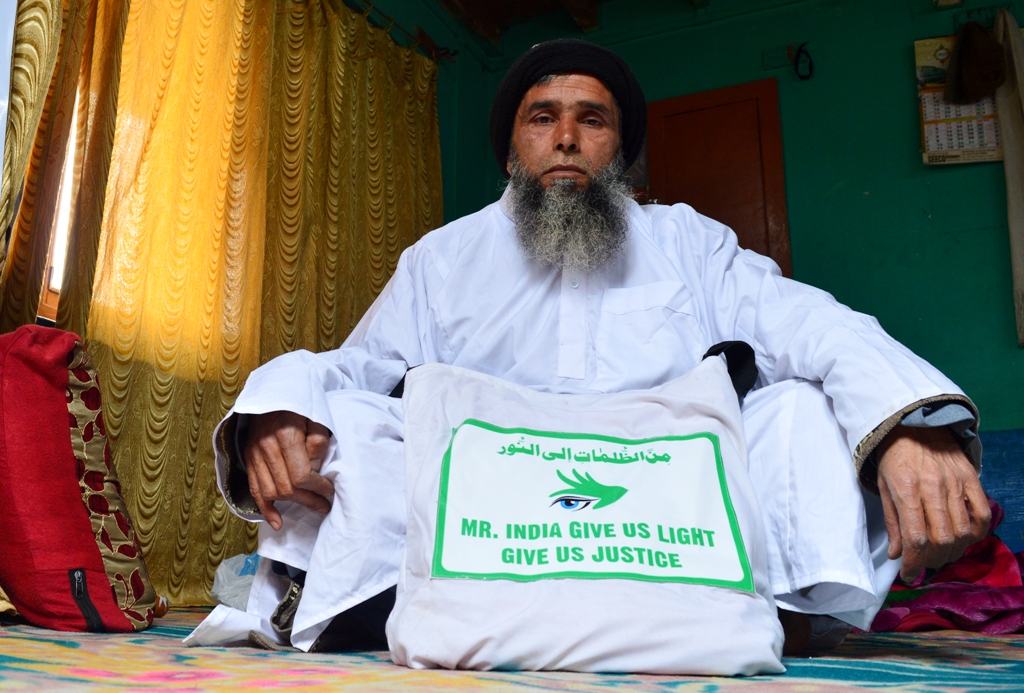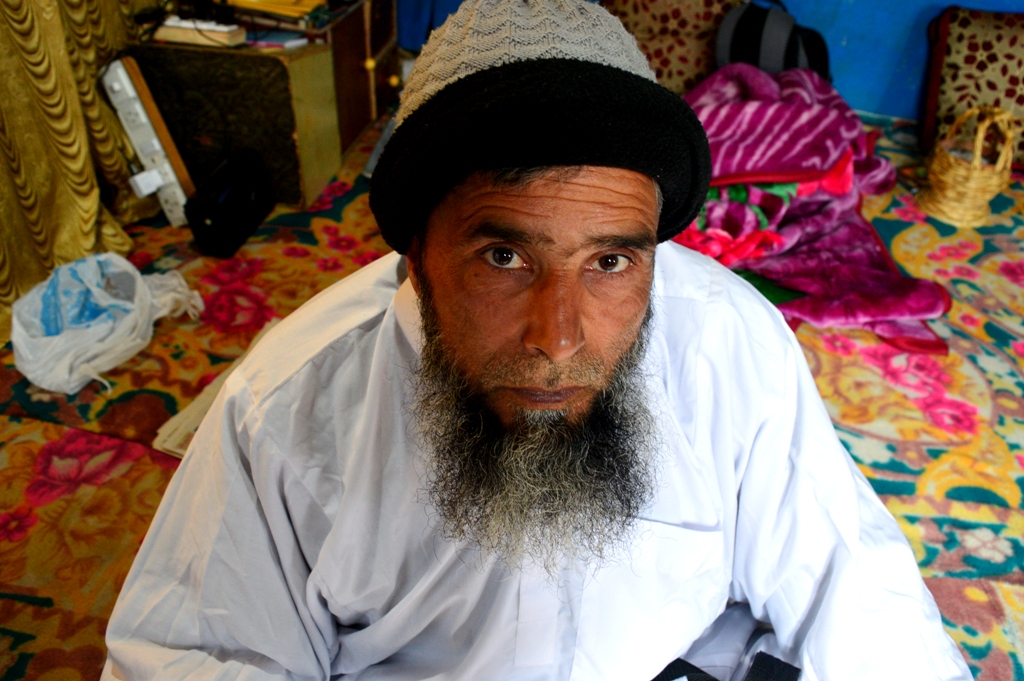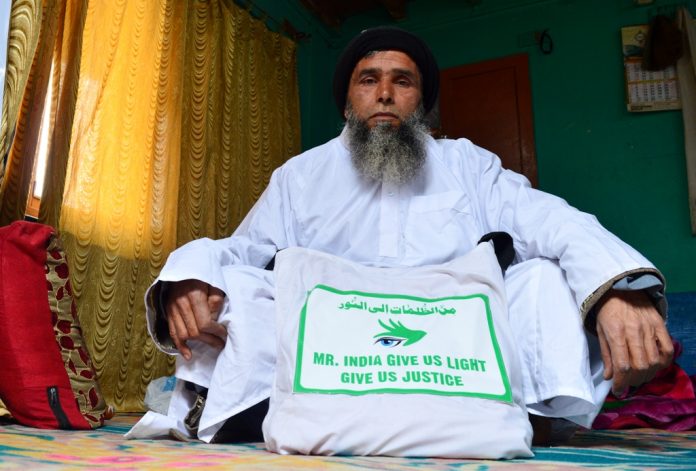By Raqib Hameed Naik, TwoCircles.net
Kakapora: As a common Kashmiri, what can you do to bring peace in the region? Protest? Keep quiet? Donate? Participate in the peacebuilding process? Remain silent? For most, the answer remains lost amidst all these propositions; and never revealed fully.
In July 2016, within hours of the encounter of Hizbul commander Burhan Wani, the Kashmir valley, and especially South Kashmir, erupted on the streets to protest. Some vented their anger through protests, even as they doubled-up to rush the injured to hospitals. Some helped with financial donations, others helped by just being there. The pain of the Valley was felt by all its residents, yet as the death toll rose and the injured filled up every nook and corner of already-crowded hospitals, the same old question popped up: what can a common Kashmiri do to help?

In Kakapora, 27 km from Srinagar, a 53-year-old man, Ali Mohammed Reshi watched the proceedings silently. Given his age, the recent turmoil seemed all too familiar to Reshi. What could he do, he wondered, staring blankly. Then, the idea struck him. He was staring with both his eyes. He had two eyes, and they had perfect vision. The fact that he had two eyes instantly made him better off than the thousands of children and youth who had been blinded by the dreaded pellets of the Indian security forces. In Kashmir, nothing can be taken for granted.
And to go back to the same old question: ‘What can a common Kashmir do?’ Reshi had found his answer. He would look for a person who had been blinded by pellets and donate one of his eyes. The only condition? He would donate it only to a person who had lost both their eyes and was keen to pursue his/her education.
Kashmir. Here, even an act of donation must be political.
The story of Reshi will sound familiar to a lot of Kashmiris. Popularly called Ali Jaan in the town, he was once, as he admits, a part of the Jammu and Kashmir Police, which over the years has turned on its own people with such ferocity that it no longer is seen as “its own” by the residents.
“I was a wireless technician in JK police. In 1989, I was arrested by Border Security Force. During those days, there was no pre-requirement for getting arrested. If you had a beard, you could be arrested. If you even wore good shoes, you could be arrested. I did not wear good shoes, but still spent six months in Jail,” recalls Reshi.
After coming out from detention, he left police service and also his beloved Kashmir. The next 12 years saw him find a new ‘home’ and a new life in the Indian city of Hyderabad. Those 12 years, Reshi says, was a period of intense learning for him. He started working as a private teacher in a local school and went on to set up a south-Indian eatery in the city.

He married in Hyderabad and was blessed with three boys and one girl.
In 2002, Reshi decided to come back home in Kashmir believing that the guns had fallen silent and peace had returned.
He soon found out that nothing deceives a Kashmiri more than the promise of ‘peace’.
“When I returned, I saw an atmosphere of fear created by Ikhwan (the government supported renegades). Nobody would dare to go to a government office,” he recollects.
Trying to establish peace and sense of security in his town which he felt in Hyderabad during his decade-long stay, Reshi began his crusade for peace and development in the town which got him much fame. Since then, he hasn’t looked back, but optimism can be dangerous in Kashmir, as he soon found out. The recent unrests once again shook his belief that he could see peace return to the valley in his lifetime.
In the months following the death of Burhan Wani, the people in South Kashmir were caged in their homes due to the volatile situation in their towns and villages, coupled with frequent curfews.
“Newspapers were the only source of information for us, and they too did not arrive regularly. It is from newspapers that I came to know about the gravity of the situation as to how children were being targeted and blinded by pellets,” says Reshi.
For Reshi, Islam is an important source of inspiration for him and he feels that life is about sacrifice. “Religion teaches that a person should seek light over darkness, but the government here is taking our generation from light to darkness.”
A regular blood donor, Reshi is looking out for pellet victim, who lost both eyes and wishes to pursue further education. Weeks after making his mind to donate one eye, he started going to villages in Pulwama and localities in Srinagar city looking out for pellet victim, whom he can donate his eye.
Starting at Fajr (morning prayers), his search for pellet victims continues till Maghrib (prayer after sunset).
“The first word revealed in Quran was “Iqra” meaning read. So education is the best tool to get away with darkness. Tell me what education can they get when they are blinded by pellets?,” Reshi asks.
Until he has both his eyes, Reshi says he will continue promoting non-violent methods to promote peace, or a semblance of it, in all ways possible. Last December, he marched 60 km, wearing a white shroud with a white flag from Kakapora town to Charari Sharief, a Muslim shrine in Budgam district.
The words on flag read, “ Jangh wa Hathyar nhi, Ilam wa hunar dedo. Sangh was barood nhi, Aman wa Zindigi dedo (Give us education and skills, instead of war and weapons. Give us peace and life instead of stones and dynamites.)
He is also known to enter ground zero too, often coming between security forces firing “non-lethal” weapons, sometimes ‘lethal’ and youths pelting stones. Knowing well that the security forces are most likely to ignore, or worse, shoot him, he instead speaks to the youth and pleads to them to return home and seek education. He believes that only youths educated in the proper sense can bring peace and solution to Kashmir’s decade-long conflict.
As of now, Reshi is continuing his search for deserving pellet victim to whom he can donate his one eye, and the other after his death.
“Donating my eyes will just complete purpose of my life,” he says “I hope that other people will also follow my way and help these blinded youths,” he adds.

